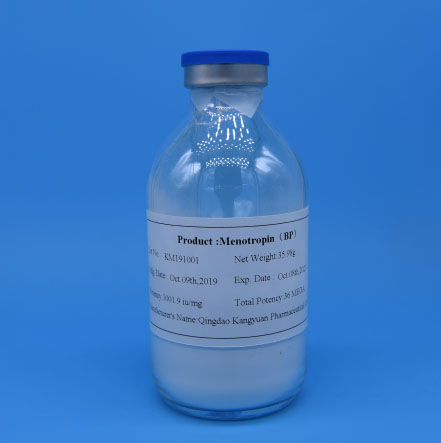In the intricate realm of reproductive health, Human Menopausal
Gonadotropin (hMG) has emerged as a powerful ally for those striving to overcome
infertility challenges. This article delves into the fascinating world of hMG,
exploring its functions, applications, and the reasons behind its growing
significance in the field of reproductive medicine.
Human Menopausal Gonadotropin is a unique pharmaceutical preparation. It
contains a combination of follicle - stimulating hormone (FSH) and luteinizing
hormone (LH), both of which are crucial for the normal functioning of the
reproductive system. These hormones are extracted from the urine of post -
menopausal women, providing a natural and effective way to influence the
hormonal balance in the body.

One of the primary applications of hMG lies in the treatment of female
infertility. For women with ovulatory disorders, hMG can be a game - changer.
Conditions such as polycystic ovary syndrome (PCOS), where hormonal imbalances
disrupt the normal ovulation process, can be addressed with hMG. By providing
the necessary FSH and LH, hMG stimulates the ovaries to develop and mature
follicles. This, in turn, increases the likelihood of successful ovulation. In
fact, studies have shown that in women with PCOS, treatment with hMG can lead to
ovulation rates of up to 70 - 80% in well - monitored cycles.
hMG also plays a vital role in assisted reproductive technologies (ART),
particularly in in - vitro fertilization (IVF). In an IVF cycle, the goal is to
obtain multiple mature eggs for fertilization. hMG is administered in carefully
calculated doses to stimulate the ovaries to produce a sufficient number of
follicles. This is essential as more follicles mean a higher chance of
retrieving multiple viable eggs. For example, in a typical IVF cycle using hMG,
on average, patients can expect to have around 6 - 12 follicles develop to a
suitable size for egg retrieval. This significantly improves the odds of
achieving a successful pregnancy through IVF.
Compared to some other fertility treatments, hMG offers distinct
advantages. For instance, in contrast to treatments that rely solely on
synthetic FSH, hMG provides a more balanced hormonal stimulation. The presence
of both FSH and LH mimics the natural hormonal environment more closely, which
can lead to a more physiological response in the ovaries. This may result in a
better - quality egg development and a reduced risk of ovarian hyperstimulation
syndrome (OHSS), a potentially serious complication associated with over -
stimulation of the ovaries.
However, like any medical intervention, hMG is not without its
considerations. Side effects can include injection - site reactions, mild
abdominal discomfort, and in rare cases, mood swings. But with proper medical
supervision and regular monitoring, these potential issues can be managed
effectively. The potential benefits of hMG in helping individuals and couples
achieve their dream of parenthood far outweigh these relatively minor
concerns.
In conclusion, Human Menopausal Gonadotropin is a remarkable tool in the
arsenal of reproductive medicine. Whether it's helping women with ovulatory
problems conceive naturally or playing a pivotal role in assisted reproductive
procedures, its impact on the lives of those struggling with infertility cannot
be overstated. If you or someone you know is facing fertility challenges and
considering treatment options, hMG could be a viable solution. Don't hesitate to
reach out to our team of experts at Kangyuan. We are committed to providing you
with the most accurate information and personalized treatment plans to guide you
on your journey to parenthood.